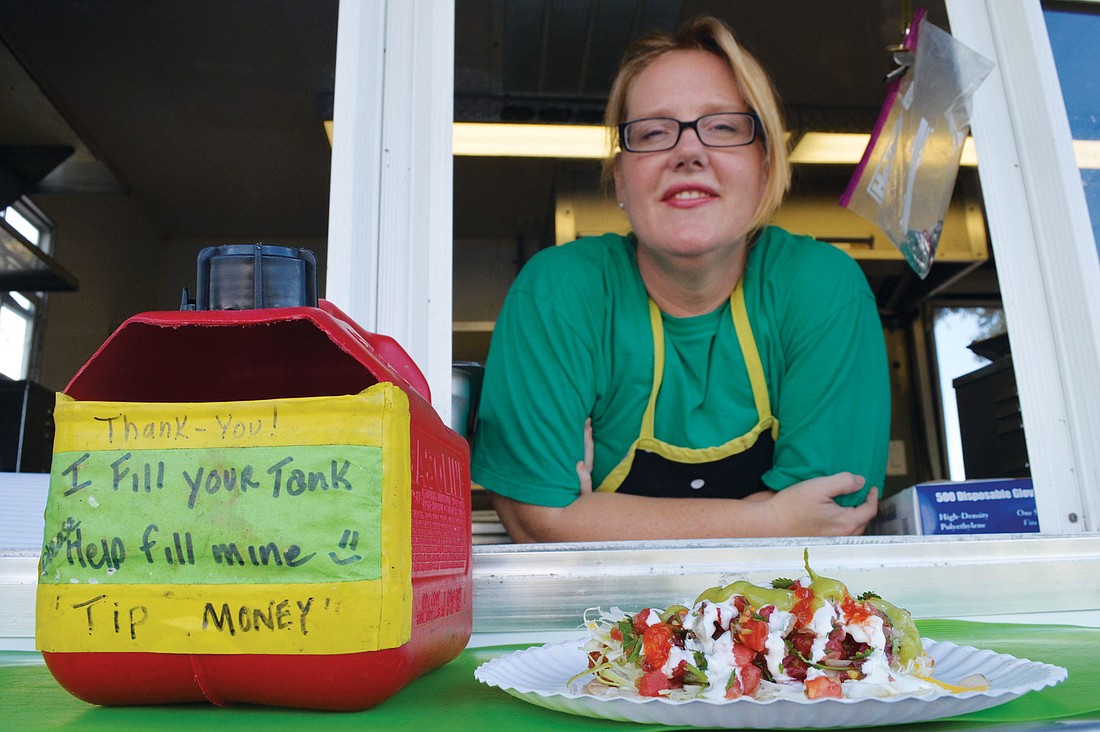- April 16, 2024
-
-
Loading

Loading

While waiting for the Baja Boys Grill to open, Dave McGinniss knew this food truck was different.
The facilities manager at Pen West Office Park, which sits on the corner of Fruitville Road and Tuttle Avenue, spent 30 years doing construction in Bradenton and Sarasota. He recalled the unsanitary state of steel-topper pick-up trucks that sold greasy Chinese food near work sites.
Baja Boys Owner Michelle Jett’s first time at the location was Jan. 11. She usually sells tacos, burritos and quesadillas at the corner of U.S. 301 and Adams Lane, where the city of Sarasota allows Suncoast Food Trucks to operate its mobile-vending collective of Baja Boys and five other trucks.
Unincorporated Sarasota County is more restrictive, but that could change in the next two months.
Opponents of food trucks cite concerns about cleanliness, unfair competition with nearby restaurants, aesthetics and pedestrian safety in arguments against mobile street vendors.
Last year, the Siesta Key Chamber of Commerce and two other island organizations fought a food-truck permit application, citing those concerns.
Sarasota County staff submitted a report Jan. 11, to County Administrator Randall Reid on the viability of food trucks outside their current allowed zones. Street vendors are allowed on private property in three zoning districts. Restaurants are permitted to operate in seven districts.
Staff asked for a discussion item on the topic, as well as other zoning issues, within the next two months, according to the report.
A code-enforcement officer Jan. 16 told Jett she could not operate anymore at Pen West. At press time Jett had not received an answer as to why.
The county confines vendors’ carts to 10 feet by 20 feet and four wheels, according to the county’s municipal code, and mandates they operate at least 800 feet from an established restaurant and 750 feet from another mobile vendor.
Currently, street vendors must obtain an annual temporary-use permit to operate in unincorporated areas of Sarasota County. Siesta Village businesses use temporary-use permits to serve street food as vendors during island events, such as the Siesta Fiesta.
According to the Jan. 11 report, applicants for temporary-use permits in unincorporated county areas have told county staff that the size restrictions strain the ability to “provide proper sanitation methods for cooking utensils.”
County staff will also consider more flexibility in the size restriction, according to an email from County Planning and Development Director Tom Polk to Reid.
In the case of GumboMojo, the food truck Siesta business and residential organizations opposed in the Village, opponents said the aesthetics would not match the surroundings.
Businesses in the Village pay additional property taxes for beautification of the commercial district, for which GumboMojo would have been exempt.
The County Commission declined the permit for GumboMojo, and the owners have since sold the truck, Jett said.
Restaurants pay property taxes along with their business taxes. And brick-and-mortar eateries within public-improvement districts pay additional taxes on top of that.
Proponents say food trucks don’t compete with established restaurants, because they offer limited seating (Jett had two picnic tables behind her truck) and a strictly outdoors setting.
Fully loaded food truck
Inspectors examine Baja Boys’ truck as many as four times per year, Jett said during a Jan. 11 interview.
Preparation work that day began at 6:30 a.m., but Jett clearly doesn’t mind working for her food.
“It took me 18 months to get my white sauce right,” Jett said. The citrus-infused sauce goes on top, or inside, her dishes.
Food trucks aren’t capital intensive, which make them attainable for new entrepreneurs. And with the ability to move to different locations, mobile-food vendors have agile access to new markets.
Jett brought double the supplies she would need for an average day at the downtown location — 500 tortillas; 10 pounds of pork; 10 pounds of chicken; and 10 pounds of ground beef. She also had 30 pounds of fish.
McGinniss said he’s partial to the Mexican meals Baja Boys serves. And having a new lunch option gives him something to look forward to Tuesday through Friday.
Jett’s truck is 8 feet by 16 feet, and boasts a green-and-orange surfer theme, complete with surfboard-shaped sign above the serving window. The size restrictions in unincorporated Sarasota County don’t affect Baja Boys, but Jett said she wants the freedom to set up on private property when invited to do so by its owner.
Ron Overing, an employee at Planned Parenthood, tracked Jett to her new location through a Facebook post to order his usual three fish tacos.
“(Food trucks) bring culture to Sarasota,” Overing said. “I’ve met more people at these types of places than I ever have at a restaurant.”

Preparing for a food-truck frenzy
Michelle Jett started preparations at Baja Boys Grill at 6:30 a.m. Jan. 11.
It was her first time at the Pen West Office Park at the intersection of Fruitville Road and Tuttle Avenue.
Jett, co-owner of Baja Boys, didn’t use any scientific method to determine how many ingredients to pack.
She guessed that five bunches of parsley; 10 pounds each of chicken, pork, and ground beef; 30 pounds of cod; 30 diced tomatoes; and 500 tortillas would be enough toa satisfy customers, including the property’s Facilities Manager Dave McKinnis, who greeted Jett after she parked just after 11 a.m.
But parking proved to be the most difficult aspect of the new location, Jett said.
“I’m a natural blonde,” she chuckled.